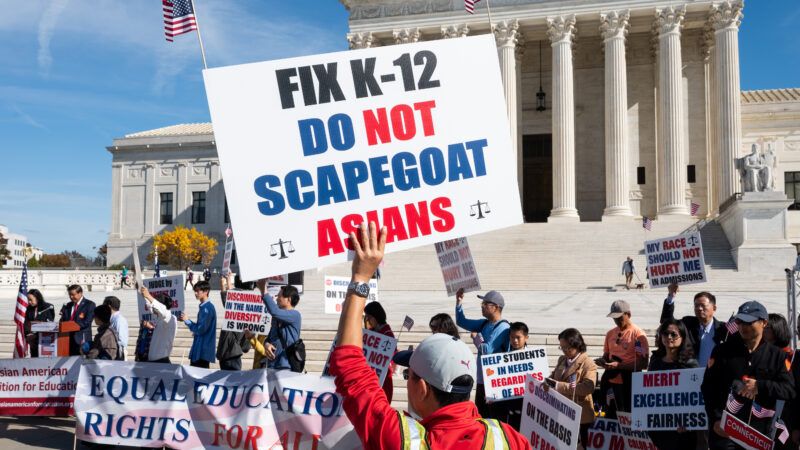The Supreme Court Could End Affirmative Action
In the two cases, brought against Harvard and the University of North Carolina, anti-affirmative action group Students for Fair Admissions argues that race-conscious admissions violate the Civil Rights Act

Race-based affirmative action in college admissions is likely on its way out, as the Supreme Court began hearing arguments in two cases challenging the policy.
On Monday, the Supreme Court began hearing arguments on two cases brought by Students for Fair Admissions (SFFA), an anti-affirmative action group, seeking to challenge the University of North Carolina (UNC) and Harvard University's race-conscious admissions policies. While the Court has sided in favor of colleges seeking to use race-based affirmative action policies in the past, most recently in 2016, the Court's current conservative majority leads legal experts to believe that the policy will most likely be ruled unconstitutional.
The cases against the schools were filed separately, with the case against UNC filed in 2014 and the case against Harvard filed in 2015. The Supreme Court combined the cases in January of this year but separated them again so that Justice Ketanji Brown Jackson, a former member of the Harvard Board of Overseers who had recused herself from the case against Harvard, could participate in the UNC case. Arguments in both cases began on Monday.
In the case against UNC, SFFA argues that the school's race-based affirmative action policies violate the Constitution's equal protection clause and Title VI of the Civil Rights Act. As Harvard is a private university, SFFA is only arguing that Harvard's policies violate the Civil Rights Act.
In both cases, SFFA alleges that race-conscious admissions procedures amount to illegal racial discrimination against white and particularly Asian applicants. The case against UNC sticks to attacking the school's affirmative action policy, but the case against Harvard is more complex. SFFA argues that Harvard's consideration of race in admissions includes both affirmative action policies and an attempt to penalize Asian students in particular by encouraging interviewers to rank them lower than other groups on a "personal rating"—a score from 1–6 (with 1 being the highest score) that measures traits like "courage," "likability," and "kindness." SFFA argues that Harvard ranks Asian applicants much lower on this subjective metric to justify rejecting them at higher rates than other racial groups—despite the demographic having the highest average test scores of any racial group.
"According to an unrebutted model of the personal rating, Asian Americans receive the lowest personal ratings among all races," wrote SFFA attorneys in their petition for a writ of certiorari in the Harvard case. "Harvard concedes that Asian Americans suffer a penalty on the personal rating—that changing an applicant's race from white to Asian lowers the personal rating to a statistically significant degree."
SFFA argues that in both circumstances, UNC and Harvard can achieve racial diversity by favoring economically disadvantaged students rather than students from certain racial backgrounds.
In response, both Harvard and UNC argue that their practices are legal and protected under current precedent, which supports race-conscious admissions because it is a narrowly tailored practice used to achieve the compelling state interest of attaining a diverse student body. Harvard believes that "a diverse student body is central to fulfilling our educational mission, that diversity enhances education for all, and that Harvard does not discriminate against any group in its admissions practices," Harvard President Lawrence Bacow wrote in a July statement. "We remain steadfast in our belief that every college and university must retain the freedom and flexibility to create the diverse educational communities that will prepare their students for the opportunities and challenges they will confront in an increasingly diverse society."
If the Supreme Court decides to end affirmative action in college admissions, the decision will likely be greeted with support by most Americans, including majorities of the very racial groups affirmative action policies are designed to benefit.
According to 2022 polling from Pew Research, 74 percent of Americans believe that race or ethnicity should not be a factor in college admissions decisions, while only 7 percent believe it should be a "major" factor. A majority of all racial groups polled believed that race should not be a factor in college admissions, including 59 percent of black respondents and 68 percent of Hispanic respondents.
Affirmative action policies in college admissions are likely nearing their final days. While the Supreme Court has twice defended the use of race-conscious admissions in recent years, the Court's conservative majority is very likely to overturn precedent and rule that race-based affirmative action policies are unconstitutional.


Show Comments (146)